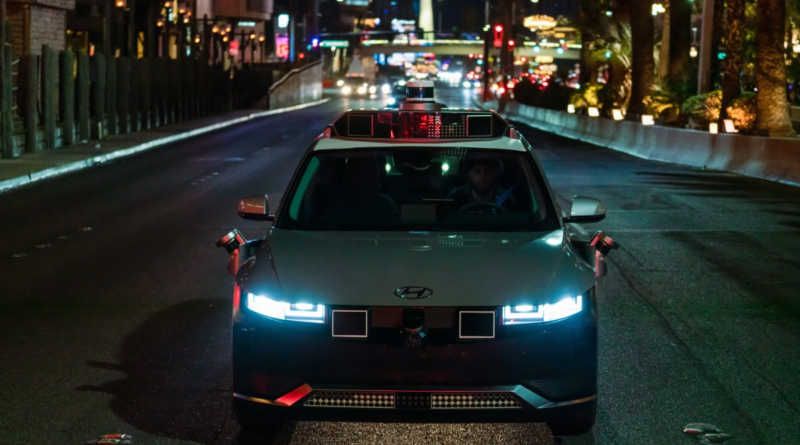Autonomous vehicle company Motional is about to lose a key backer
Autonomous vehicle company Motional is losing capital support from one of its primary backers as it aims to commercialize a robotaxi service in 2024.
Automotive supplier Aptiv — the other half of a $4 billion joint venture with Hyundai that created Motional — said Wednesday it will no longer allocate capital toward the endeavor.
“While our Motional joint venture continues to make progress on their technology roadmap, we’ve decided to no longer allocate capital to Motional and are pursuing alternatives to further reduce our ownership interest,” Aptiv Chairman and CEO Kevin Clark said during the company’s fourth-quarter earnings call Wednesday.
“The costs related to delivering the tech principally, in and around hardware, really makes it challenging from an adoption standpoint in the mobility on-demand market,” Clark said.
In other words, standing up a robotaxi service is costly and the timeline of recapturing those precious dollars is too long for Aptiv to wait.
Aptiv CFO Joe Massaro later added that the company is “exploring steps to reduce a significant portion of our common equity while working within the construct of the joint venture agreement.” The exact timing of the reduction is not yet known, he said.
Motional, which operates an autonomous vehicle taxi service in Las Vegas (still with human safety operators behind the wheel) on Uber, Lyft and Via platforms, downplayed Aptiv’s announcement in its quarterly earnings call.
“We’re confident in our funding roadmap and are well-positioned for the next phase of our commercialization,” an emailed statement from the company reads. “Our team is focused on scaling our driverless services, expanding Motional’s commercial partnerships and furthering development on Motional’s next-generation robotaxi in collaboration with Kia. Aptiv and the Hyundai Motor Group remain Motional shareholders, and there are no ownership updates at this time. Motional is uniquely positioned through our strategic partnerships with our shareholders, and we continue to have their strong support and collaboration.”
Motional roots
Motional wasn’t manifested in an Aptiv and Hyundai board meeting.
In 2013, Karl Iagnemma and Emilio Frazzoli founded nuTonomy, a Boston-based autonomous vehicle startup that was one of the first to successfully test the technology on public roads. Automotive parts supplier Delphi acquired nuTonomy in 2017 for $450 million. Delphi would later split into two companies: its powertrain business became Delphi Technologies, while Aptiv would focus on the design and production of electronic systems, advanced safety technology and the hardware and software required for autonomous vehicles. nuTonomy was absorbed into Aptiv.
Two years later as the hype and promise around autonomous vehicles peaked, Hyundai and Aptiv formed a joint venture — later branded Motional — to commercialize self-driving cars. Iagnemma, who had been president of Aptiv’s autonomous mobility group, was picked to head up Motional.
At the time, the companies said the combined investment in the joint venture would total $4 billion in aggregate value, including the value of combined engineering services, R&D and IP. Aptiv agreed to bring its autonomous driving technology and about 700 employees, while Hyundai Motor Group said it would provide a combined $1.6 billion in cash from across its sub-brands, vehicle engineering, R&D and access to its IP.
Its aim was to begin testing its AVs in 2020 and commercialize the tech by 2022, a target that now seems outlandish, but was in step with the rest of a nascent and bullish industry. Motional, along with the rest of the industry, has since adjusted its commercial targets.
And the company has made some progress toward its goal of launching a robotaxi service using driverless Hyundai Ioniq 5 vehicles in 2024. In November, Hyundai Motor Group and Motional announced plans to co-develop production-ready versions of the all-electric Ioniq 5 robotaxi at the automaker’s new innovation center in Singapore, the Hyundai Motor Group Innovation Center Singapore (HMGICS). A production-ready autonomous vehicle, equipped with the kind of redundancies designed for safe operations without a human driver, is a critical milestone required for commercial operations.
The company is testing its autonomous vehicles — always with human safety operators behind the wheel — in Boston, Pittsburgh, Las Vegas, Los Angeles and Singapore. It is also operating an autonomous delivery service in Los Angeles with Uber Eats. During CES 2024, the company announced plans to work with Kia on a next-generation vehicle that will enter commercial operations later this decade. The initial development process will begin this year, according to the company.




